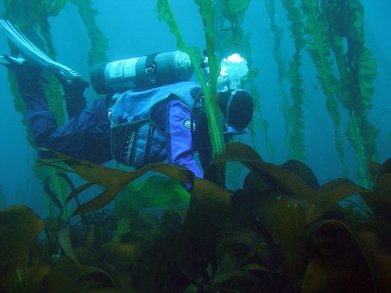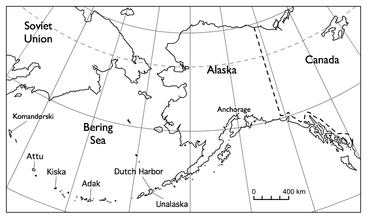 Dr. Matthew Edwards diving in lush kelp forest in the Aleutians. (Photo Dr. Brenda Konar) Dr. Matthew Edwards diving in lush kelp forest in the Aleutians. (Photo Dr. Brenda Konar) Why: This is the big one, so it gets listed first. Why are we going to the Aleutians? The widespread loss of sea otters throughout the Aleutian Archipelago has resulted in a dramatic increase in sea urchin abundance and a corresponding loss of kelp forests. (THIS article is a great overview of ecological theory related to this topic and takes a deeper look into how sea otters ‘balance’ ecosystems, see the end of the article “Sea Otters and their Cascading Effects”). Our over-arching goal is to examine how the widespread loss of kelp forests effects primary production, biodiversity and nutrient cycling across a range of habitats in the Aleutian Archipelago. Who: Thirteen scientists will be participating in the shipboard research effort, including: Dr. Matthew Edwards and his lab from San Diego State University (Scott Gabara, Genoa Sullaway, Sadie Small, Tristin McHugh, and Pike Spector), Dr. Brenda Konar and her lab from University Alaska Fairbanks, (Ben Weitzman, Jacob Metzger, Sarah Traiger, and Alex Ravelo), and Dr. Ju-Hyoung Kim from Chonnam National University in South Korea. What: On the cruise, scientists will be doing an array of activities with the common goal of assessing how the wide-spread loss of kelp along the archipelago influences the net ecosystem production and benthic biodiversity.
Where: The Aleutian Island chain spans 1,800 kilometers and has upwards of 300 islands of varying size (Figure 2). This summer we are visiting the Eastern Islands and will return to the archipelago in the summer of 2017 to survey the Western Islands. We are departing from Adak Island and will survey at total of 10 islands over the course of two years. In 2016, we will work at five of these islands (Adak, Atka, Chuginadak, Umnak, and Unalaska). The cruise will officially end in Dutch Harbor, and from there we will stay on the ship as it motors back to Seward where we will unload our gear and store it for next year’s expedition!
When: Starting now!! (June 16th) The cruise will last for 21 days and end in Seward, AK in early July. How: This trip is funded by the National Science Foundation, and logistically supported by Oregon State University’s R/V Oceanus captain and crew. Follow along for updates and pictures as the cruise progresses!
0 Comments
Leave a Reply. |
AuthorWrite something about yourself. No need to be fancy, just an overview. ArchivesCategories |

 RSS Feed
RSS Feed
